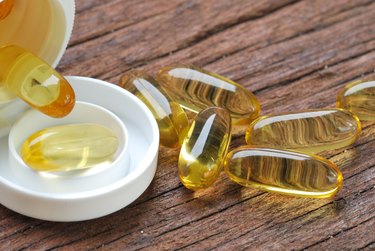
The thyroid is a small butterfly-shaped gland that sits at the front of your throat. Your thyroid uses the mineral iodine and the amino acid tyrosine to produce two primary thyroid hormones known as T3 and T4. These hormones influence the rate at which your body uses energy -- your metabolic rate. Vitamin E supplementation can be beneficial if you have certain thyroid issues but consult your doctor before taking it.
Vitamin E Function
Video of the Day
Vitamin E refers to a group of fat-soluble antioxidant compounds that exist in eight different forms. Antioxidants protect your cells from the potential damage of unstable molecules known as free radicals. Vitamin E is also involved in immune function, gene expression regulation and metabolic processes, according to the Linus Pauling Institute.
Video of the Day
Improves Hypothyroidism
Hypothyroidism is when your thyroid is unable to produce enough of its hormones to meet your body's needs. This can leave you feeling fatigued and depressed. It can also cause sensitivity to cold, constipation and hair loss. Hypothyroidism is accompanied with oxidative stress. Vitamin E supplementation improves hypothyroid symptoms through its antioxidant effects, according to a study published in the January 2005 issue of the journal "Cell Biochemistry and Function."
Exerts Thyroid Protective Effects
Though your thyroid needs iodine to produce thyroid hormones, excess intake is toxic and can damage your thyroid tissues. It can also cause excess thyroid hormone, known as hyperthyroidism. Vitamin E appears to exert thyroid protective effects. In animal studies vitamin E supplementation helps reduce iodine-induced thyroid toxicity, according to a study published in the June 2011 issue of the "Journal of Endocrinology."
Dosage and Precautions.
Vitamin E doses range from 50 to 1,000 international units. It is available in a variety of forms, including capsules, soft gels and tablets. Health care providers generally recommend natural vitamin E, which is d-alpha-tocopherol, though synthetic forms are available. Vitamin E can increase your bleeding risk if you are taking blood thinners. It can interfere with the absorption of a class of antidepressants known as tricyclics. It may also interfere with beta-blockers, aspirin and other drugs. Tell your doctor if you are currently prescribed medication. Take vitamin E only after discussing it with your doctor.